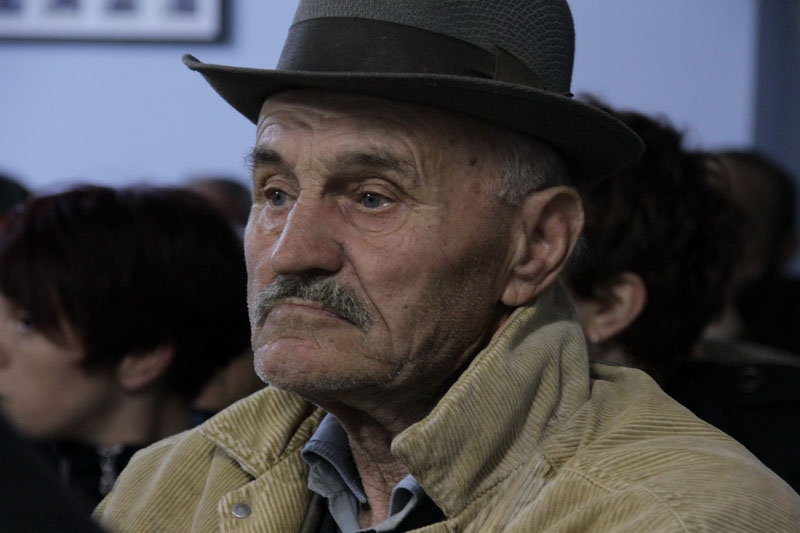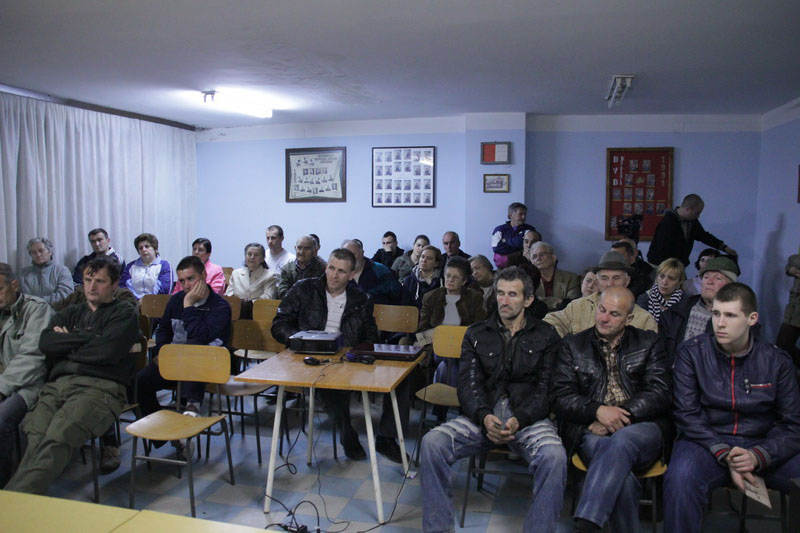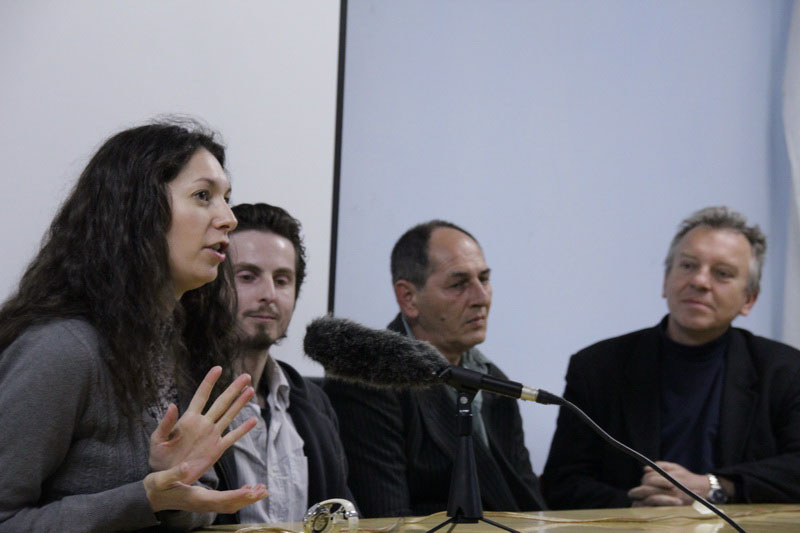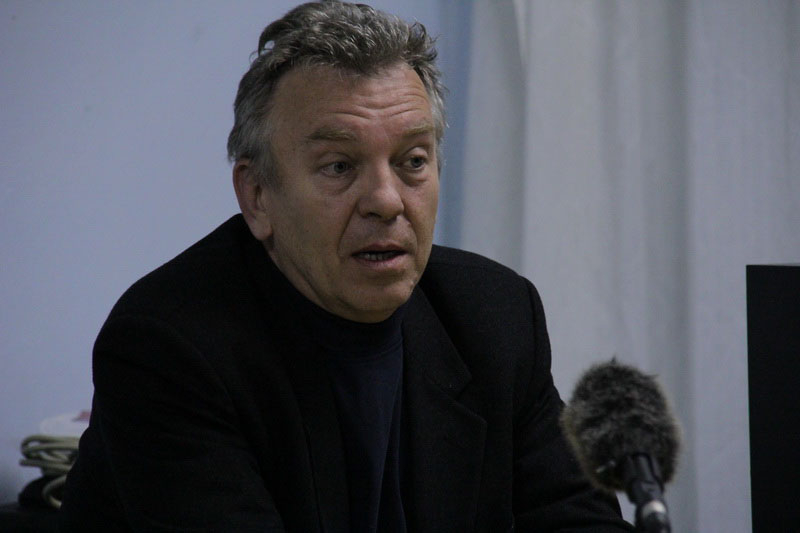“Das Böse lebt ewig” – Achte Station der Film-Tour in Rudolfsgnad (3.4.2012)
Mit großer Spannung wurde die achte Station der Film-Tour von Regisseur Marko Cvejic erwartet, hat sie doch die größte Symbolkraft: Rudolfsgnad (Knicanin). Ein Ort, der bis zur Internierung der deutschen Bevölkerung 3200 Einwohner hatte. Dieser Ort wurde von Oktober 1945 bis März 1948 zum größten Lager für die Deutschen in Jugoslawien mit bis zu 20 500 Gefangenen und mehr als 11 000 Toten umfunktioniert und gilt als Vernichtungslager für Alte, Kranke, Kinder und Frauen mit Kleinkindern. Die ersten Massengräber wurden im hinteren Teil des Friedhofs von Rudolfsgnad ausgehoben. Bis zum 13. Februar 1946 wurden dort 3334 im Lager verstorbene Personen begraben. Danach wurde seitens der Partisanenführung die Teletschka, eine etwa zwei Kilometer südlich des Ortes gelegene Anhöhe, für die Anlage von weiteren Massengräbern ausersehen. Dort sind vom 14. Februar 1946 bis März 1948 mehr als 7000 Deutsche verscharrt worden.

Große Emotionen in Rudolfsgnad - ein sichtlich bewegter und nachdenklicher Dorfbewohner - Foto: Visnja Cupic Jovanovic
Viele Szenen des Doku-Dramas “Die Donauschwaben” (Danube Swabians/Podunavske Svabe) wurden in Rudolfsgnad gedreht. Das einstige Haus des donauschwäbischen Großvaters von Maria Schneider, das die Enkeltocher gemeinsam mit Miso erfolgreich sucht, steht beispielsweise in Rudolfsgnad. Zur Film-Vorführung und der anschließenden Diskussion, an der Predrag Bambic (Film- und TV-Kameramann), Ethnologe Branislav Milic und Regisseur Marko Cvejic teilnahmen, waren am 3. April 2012 rund 40 Personen ins örtliche Feuerwehrhaus gekommen. Politikwissenschaftlerin Jelena Krstic moderierte die Diskussion. Branislav Milic, Ethnologe am Institut für Denkmalschutz in Großbetschkerek (Zrenjanin), erarbeitete bereits eine Ausstellung über die Häuser der Donauschwaben und sprach daher über den deutschen Einfluss auf die Architektur in den Dörfern des Banats.
Kurz vor Weihnachten 2011 hatte Predrag Bambic, der zweite Diskussionsteilnehmer, seine Gedanken zu den in Serbien so lange verschwiegenen Verbrechen in Rudolfsgnad (Knićanin) auf der Internetseite der Donauschwäbischen Kulturstiftung geschildert - siehe “Archiv”: Stid (Scham) - Serbische Gedanken zu Rudolfsgnad (Knićanin)
Vor Ort in Rudolfsgnad kritisierte Bambic erneut die Tabuisierung der Verbrechen an den Donauschwaben. “Das Wichtigste an dem Film ist, dass er ein Thema behandelt, dass für uns den Status eines Tabus hat, ein verbotenes Thema ist”, so Bambic, ehe er ergänzte, dass diese Verbrechen nicht nur die Deutschen in der Vojvodina, sondern auch die Deutschen in Frankreich, Polen und anderen Ländern erlitten hätten.
Regisseur Cvejic betonte, dass die Frage der Gewalt gegen die Deutschen eigentlich eine universale Angelegenheit sei. “Das ist ein Drama, das nicht nur die Deutschen betrifft, denn unschuldige Menschen wurden überall umgebracht”, so der Filmemacher. Es gehe generell um Gewalt, besonders im zeitgenössischen Serbien. Eine Besucherin dankte dem Regisseur für seinen Mut und urteilte: “Das ist eine Geschichte über das Böse, das so lange existiert wie der Mensch lebt und es wird wohl ewig bestehen. … Die Geschichte handelt von unschuldigen Menschen, die gezwungen wurden, ihre Häuser zu verlassen; ihre Familien wurden umgebracht.”
Zuvor war der Film am 28. März 2012 in Maria Theresiopel (Subotica) und am 30. März 2012 in Weißkirchen (Bela Crkva) gezeigt worden. In Maria Theresiopel (Subotica/Batschka) stand vor 30 Teilnehmern einmal mehr die Frage der Kollektivschuld im Raum. Publizist Teofil Pancic meinte hierzu: “Eine Kollektivschuld gibt es nicht. Der Philosoph Karl Jaspers diskutierte diese Frage in seinem Buch ‘Die Schuldfrage’ (Heidelberg/Zürich 1946; Anm. DKS) und brachte dabei das Konzept der Kollektivschuld zum Einstürzen. Es gibt eine kollektive Verantwortung und das ist eine moralische Frage. Wir sind verantwortlich für Sarajevo, Srebrenica, Vukovar. Aber das bedeutet nicht, dass wir schuldig sind. War das meine Schuld, sollte ich dafür ins Gefängnis gehen? Es ist eine moralische Frage, weil es jemand in meinem Namen tat und ich hatte eine moralische Verantwortung, es zu verhindern. Und falls ich es nicht verhindern konnte, dann besteht wenigstens die Möglichkeit, den Täter zu bestrafen. Wenn der Staat das nicht getan hat, so kann ich als Bürger sagen: ‚Das war nicht in meinem Namen, ich stehe nicht dahinter. Schreib mir das nicht zu, ich identifiziere mich nicht damit.’ Diese Dinge wurden jahrzehntelang zu wenig berücksichtigt.”
In Weißkirchen (Bela Crkva/Banat) meldete sich unter den 50 Besuchern eine Angehörige der deutschen Minderheit zu Wort und berichtete von den Diskriminierungen, denen sie als Kind in der Schule ausgesetzt war. “Meine Mutter war in Pantschowa (Pancevo) im Lager, wo heute der Markt ist. Sie war ein dreizehnjähriges Mädchen. Ich würde gerne einen Film darüber machen, weil die Zeitzeugen noch leben und sich erinnern können”, erklärte die heimatverbliebene Donauschwäbin ferner.
Marko Cvejic, der junge serbische Regisseur, präsentiert das Doku-Drama “Die Donauschwaben” (Danube Swabians/Podunavske Svabe) in den Monaten März und April an ingesamt dreizehn Orten in der Vojvodina, ehe im Mai und Juni weitere Termine in Deutschland folgen.
Die DVD “Die Donauschwaben” (Danube Swabians/Podunavske Svabe) mit deutschen Untertiteln ist ab sofort über das Donauschwäbische Zentralmuseum in Ulm zu bestellen. Die Kontaktdaten lauten:
Donauschwäbisches Zentralmuseum
Schillerstraße 1
D-89077 Ulm
Tel: +49 731 – 96 254 - 0
Fax: +49 731 – 96 254 - 200
ePost: info@dzm-museum.de
Internetseite: www.dzm-museum.de
Mehr zum Film “Die Donauschwaben” (Danube Swabians/Podunavske Svabe) und zur Film-Tour unter:
Die gesammelten Meldungen zu Marko Cvejics Film “Die Donauschwaben
Weitere Informationen über die offizielle Internetseite der serbischen Filmproduktionsfirma:
www.mandragorafilm.com

Rund 40 Personen fanden sich im Versammlungsraum des Feuerwehrhauses in Rudolfsgnad ein - Foto: Visnja Cupic Jovanovic
Knićanin, 4. april 2012. - Sinoć je u Knićaninu, u Vatrogasnom domu, pred auditorijumom od 40 pripadnika/-ca lokalne zajednice održana projekcija filma “Podunavske Švabe” reditelja Marka Cvejića, i odmah nakon toga jako dinamična panel diskusija.
Svoje utiske o filmu i pitanjima koja pokreće dali su Predrag Bambić, filmski i TV snimatelj, Branislav Milić, etnolog, i Marko Cvejić, reditelj i scenarista filma. Skup je moderirala Jelena Krstić, politikolog.
Branislav Milić, etnolog Zavoda za zaštitu spomenika kulture Zrenjanin, inače i autor izložbe o švapskiim kućama, govorio je o nemačkom uticaju na arhitekturu sela srednjo-banatskog regiona.
“Značaj ovog filma ne bih ograničio samo na njegov zabavljački, filmski aspekt. Glavni značaj je što provocira jednu temu koja je za nas, uglavnom, imala status tabua, zabranjene teme. Iz perspektive početka XXI veka je lakše govoriti o tome, nego sredinom prošlog veka. Nije se to desilo samo Nemcima u Vojvodini, već i Nemcima u Francuskoj, Poljskoj i drugim zemljama. Ta tema, koju moja generacija nije mogla da čuje kao element istorije, načeta je samim činom stvaranja ovog filma, i tu je glavni, širi društveni značaj ovog filma. Bilo bi zgodno kada bismo što pre ušli u dijalog da vidimo šta nam tematski donosi ovaj film, u smislu gubitka kulturne raznolikosti, elemenata kulture Vojvodine koja je bila zaokružena celina u okviru multinacionalnog carstva” – istakao je Predrag Bambić.

An der Diskussion in Rudolfsgnad nahmen Moderatorin Jelena Krstic, Regisseur Marko Cvejic, Ethnologe Branislav Milic und Kameramann Predrag Bambic (von links nach rechts) teil - Foto: Visnja Cupic Jovanovic
Nakon poziva na dijalog publika je vrlo intenzivno i emotivno reagovala na film i mogla su se uočiti oprečna stanovišta – od odobravanja i pohvala, do oštre osude i negativnog stava prema filmu. Jedan deo razloga ovakve reakcije leži u tome da je igrani deo filma sniman u Knićaninu, tako da su stanovnici ovog sela u velikoj meri prepoznali kao svoju i lokalizovali priču filma. Zatim, u Knićaninu je bio i najveći logor u kom je veliki broj Nemaca stradao.
“Smeta mi jedan deo filma. Ako smo u sadašnjosti zašto ja ne vidim, i nisam čuo za nepoštovanje i netrpeljivost između Srba i Nemaca, to mi smeta. Mi imamo jako dobre odnose sada.” – rekao je gospodin Jocić, predsednik srpsko-nemačkog društva, i predsednik Mesne zajednice Knićanin.
“Dopada mi se ovaj film jer pokreće nešto što je, sa vremenske distance, tabu tema. Pozitivno je i pohvalno što ste krenuli putem diskusije da biste došli do nekih saznanja. Nakon 60, 70 godina je konačno nešto urađeno i treba i dalje raditi na tome” – rekao je jedan od učesnika.
Jedan od mlađih učesnika panela reagovao je vrlo emotivno: “Ostavilo mi je utisak to nasilje, odmah sam ga uporedio sa filmom Parada, ispade da smo mi najgori. Uopšte se ne vidi neka dobra strana Vojvodine, ispada da smo mi ista ta bagra. Ima ovde mržnje, ali da ne volimo Nemce, to nije tačno”.
Reditelj je u odgovoru objasnio svoje namere prilikom snimanja filma, pre svega da to nije drama koja je pogodila samo Nemce, jer nevini ljudi su svuda nastradali, ta tema nasilja nad Nemcima je univerzalna priča, to je tema nasilja uopšte koja je posebno prisutna u savremenoj Srbiji.
Drugi učesnik je naglasio: “Zahvaljujem na hrabrosti koju ste iskazali, moram da pohvalim oba dela filma, ovo je priča o zlu koje traje od kako traje čovek i trajaće verovatno još dugo. Rastužila me je reakcija na film, odmah su krenuli napadi i odbrana da mi nismo zli, ali film uopšte ne govori o tome. Priča je o tim nevinim ljudima koji su isterani iz svojih kuća, porodice su im ubijene. Malo nedostaje da opet neko dođe i uradi to ponovo, pa će neki drugi reditelj da snimi film o tebi ili meni.”
Na primedbu jednog učesnika, koji je govorio o svom prijateljstvu sa Nemcem iz Knićanina, da jedino kraj filma nije dobar, drugi učesnik je odgovorio: “To je naš kraj, mi ga pišemo našim ponašanjem.”

“Der Film behandelt ein verbotenes Thema” - Predrag Bambic am 3. April 2012 in Rudolfsgnad - Foto: Visnja Cupic Jovanovic
At 3rd april 2012, in the Fire fighters station in Knićanin, in front of the audience of 40 members of local community, screening of the film “Danube Swabians” was held, and immediately afterwards, a very dynamic panel discussion.
Their impressions about the film, and the issues raised by, gave Predrag Bambić, film and TV cameraman DOP, Branislav Milic, ethnologist, and Marko Cvejic, director and screenwriter. Jelena Krstic, a political scientist, moderated the event.
Branislav Milić, ethnologist of the Institute for the Protection of Cultural Monuments in Zrenjanin, who is also the author of the exhibition about Swabian houses, talked about the German influence on the architecture in the villages of Banat region.
“I wouldn’t like to limit the importance of this film only to his entertaining, movie aspect.
The main significance is that it provokes a topic that had the status of taboo for us, sort of forbidden topics.
From the perspective of early twenty-first century, it is easier to talk about it than at the middle of past century.
It did not happen only to the Germans in Vojvodina, but also the Germans in France, Poland and other countries.
This topic, which my generation could not hear as an element of history, broached by the act of creating this film, and there is a major, a wider social significance of this film.
It would be nice if we could entered into a dialogue as soon as possible, to see what this film is giving us thematically, in terms of loss of cultural diversity, main cultural elements of Vojvodina which was the encirclement of the multinational empire.” - said Predrag Bambić.
After a call for dialogue, the audience had very intense and emotionally reaction to the film. Completely opposite points of view could be seen – from the approval and praise, to strongly condemn the negative attitude towards the film. One of the reasons for these reactions is that the fiction part of the film was filmed in Knićanin, so the inhabitants of this village were largely recognized it as a local story. Then, the largest camp where a biggest number of Germans killed was exactly in Knićanin.
“It bothers me one part of the film. If we are talking about present time why I do not see, and I have not heard of contempt and hatred between Serbs and Germans. That bothers me. We have very good relations now.” – said Mr Jocić, president of the local comunity Knićanin and president of Serbian-German society.
“I like this movie because it is something that runs, with hindsight, a taboo subject. It is positive and commendable that you went through the discussions to come to some understanding. After 60, 70 years something is done and we should continue to work on it “- said one participant.

Branislav Milic (links) sprach über den deutschen Einfluss auf die Architektur im Banat, rechts: Predrag Bambic - Foto: Visnja Cupic Jovanovic
One of the younger participants in the panel reacted very emotionally, “It left me the impression of the violence, I immediately compared it to the film “Parade”, and it pointed that we are the worst.
You cannot even see a good side of Vojvodina, it turns out that we are the same scum.
It’s true that there is hatred here, but it’s not true that we do not like the Germans.”
The director explained his intentions for making this film, especially that it is not drama that hit only the Germans, because innocent people are killed everywhere, the issue of violence against the Germans is a universal story, this is the topic of violence in general, especially present in contemporary Serbia.
Another participant said: “I thank you for the courage you have shown, I have to commend both sides, this is a story about the evil that exist as long as the human exist, and will probably exist eternally.
I am sad because of the reaction to the film, the attacks and defence that we are not evil started immediately, but the film does not talk about it.
The story is about those innocent people who were forced to move from their homes, their families were killed.
Today, we have very close situation that someone can come back and do it again, so in some time some other director could shoot a film about you or me.”
To the remark of one participant, who spoke about his friendship with Germans from Knićanin, that only the end of the film is not good, the other participant answers: “This is our end, we write it with our behaviour.”
Tijana Rolović,
PR Mandragora film
